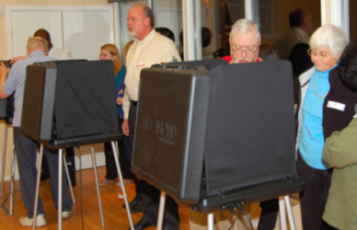The North Carolina State Board of Elections offered corrections to the Rhino Times article “Guilford County Cleans Up Voter Rolls And Settles Lawsuit,” posted on March 17.
According to North Carolina State Board of Elections Associate General Counsel Paul Cox, both the characterization of the legal issue in the article and the data quoted from the Judicial Watch press release were inaccurate.
Cox offered these five statements from the North Carolina Board of Elections in order to set the record straight.
“North Carolina elections officials made no changes to the voter rolls based on Judicial Watch’s lawsuit, because they were already in full compliance with the law.
“Judicial Watch brought a lawsuit against North Carolina election officials based on a misunderstanding of voter data and federal law. The judge hearing the case recommended that the case should be dismissed because Judicial Watch failed to explain to election officials what they were doing wrong before bringing their lawsuit, which is required under federal law.
“North Carolina’s efforts to keep the voter rolls current are clearly set forth in state law, N.C.G.S. 163-82.14, and in written policy that is followed by the county boards of elections. Any suggestion that Judicial Watch’s lawsuit changed any of North Carolina’s voter list practices is wrong.
“In this lawsuit, Judicial Watch misunderstood the cyclical nature of voter list maintenance, whereby larger numbers of voters are removed after presidential elections than after midterm elections due to greater voter registration activity in presidential years. In other words, more people initially go on the rolls in presidential years than in midterm years, and because federal law requires election officials to wait two federal election cycles before removing inactive voters, there will necessarily be more removals following presidential years.
“The State Board is pleased that after the judge recommended dismissing this case, Judicial Watch agreed to dismiss their claims on their own accord.”
Cox, in an email, offered this more detailed explanation of how Judicial Watch misunderstood the North Carolina elections data. Cox stated, “It is not true that there were 1.2 million ‘ineligible’ voters on the rolls in 2019. That was the number of ‘inactive’ voters. Inactive voters are voters who do not respond to an address-confirmation notice that is mailed to voters by the county board of elections. Those voters, pursuant to federal and state law, remain eligible voters until two federal elections elapse without them voting or otherwise having contact with the board of elections. Only then can those voters be removed from the rolls.”


RT channels Rosanne Rosannadanna with a chagrined “Nevermind”.
Shocker. No fraud. Imagine that!? Like most states, voting is managed by dedicated professionals who are highly passionate about the integrity of each individuals right to vote and vote fairly. Imagine that?
There was no mass fraud in 2020. That is just the lie told by the biggest loser crybaby in the history of American elections.
That is a ball face lie about inactive voters by the state board of elections. My daughter was on the voting roll in Pleasant Garden for more than 20 years before she was taken off 2 years ago. I complained for years while she lived in Durham, Burleson, Tx and Pensacola, Fl without success in getting her off the voting roll. They were spending all their time stopping voter IDs.
Maybe she was sending in absentee ballots for liberals and not telling you. 😉